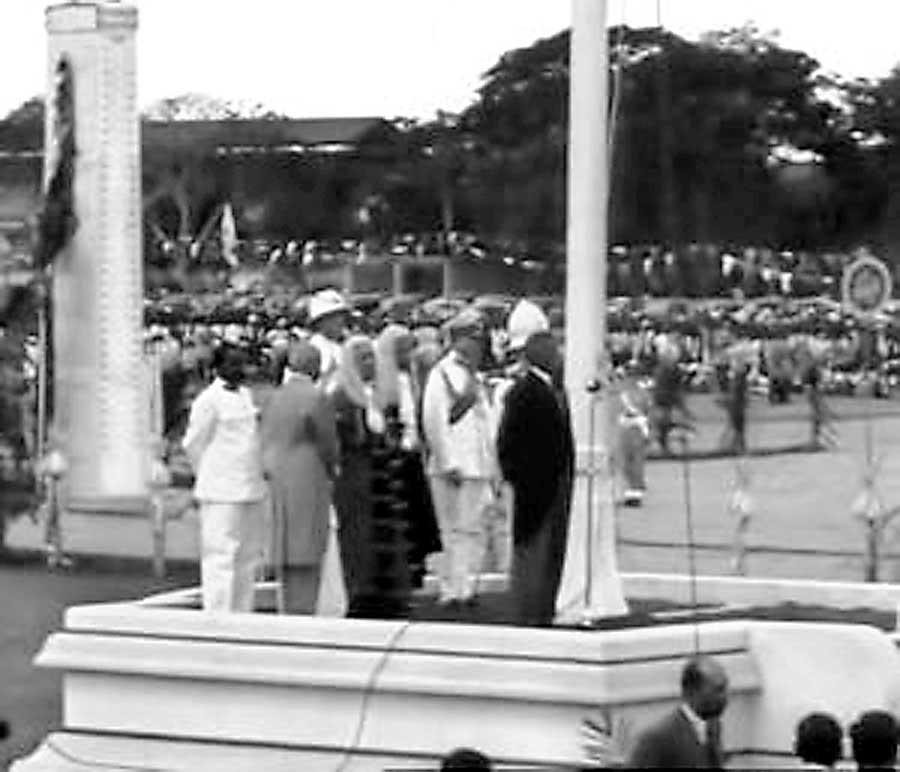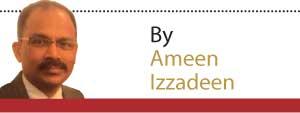03 Feb 2023 - {{hitsCtrl.values.hits}}

Independence 1948: Dependency begins
But the economic crisis that we have been plunged into is not exclusively due to our faults. The rich nations, especially those who colonised us and who continue to control us through a neocolonialist world economic order should take a portion of the responsibility for our predicament
Dependence is embedded in independence. This is the paradox we need to address as Sri Lanka prepares to celebrate its 75th anniversary of Independence tomorrow amid an unprecedented economic crisis. Ironically, the origin of the economic crisis could be traced to the country gaining Independence in 1948. Since then governments have worsened the crisis by politicising the economy.
unprecedented economic crisis. Ironically, the origin of the economic crisis could be traced to the country gaining Independence in 1948. Since then governments have worsened the crisis by politicising the economy.
Just as no human being is truly independent, no country is truly independent. In the case of newly independent countries, dependency has been on the rise since they regained their freedom in the decades after World War II.
Crisis-hit Sri Lanka is today more dependent on external help than it was at the time of independence as it genuflects before the International Monetary Fund and modern-day neo-colonialists, pleading for a bailout.
Close-fisted rich nations impose back-breaking conditions to extend some help to Sri Lanka while taking a stand that unconditional help for nations that shoot themselves in the foot with economic mismanagement will set a bad precedent.
But the economic crisis that we have been plunged into is not exclusively due to our faults. The rich nations, especially those who colonised us and who continue to control us through a neocolonialist world economic order should take a portion of the responsibility for our predicament.
At independence, the Sri Lankan leaders were not unaware of the fact that the economic model left behind by the British colonialists was meant to serve the colonialists. Even the education system we inherited from the colonialists was not geared to serve the socioeconomic interest of a newly independent state. But we perpetuated the system with all its bad baggage, though half-baked reforms were introduced from time to time.
As a result, even after independence, the colonial plunder continued through neo-colonialism.
Socio-economists such as Andre Gunder Frank argued that developing nations failed to develop not because of internal barriers to development, but because the developed West systematically underdeveloped them, keeping them in a state of dependency. This is the crux of the Dependency Theory Frank and other anti-colonial economists propounded. They insisted that Third World countries should break free from these exploitive economic relations.
Frank argued the colonialist enterprise which emerged in the 16th century had well and truly locked Latin America, Asia and Africa into an unequal and exploitative relationship with the more powerful Western nations. The system works with the core nations (Western powers) exploiting the peripheral or satellite nations – the Third World countries -- because of their superior economic and military power.
Gold from the Americas, diamonds from Africa and raw materials from Asia flowed from the colonies to the mother countries with profits going to the colonial capitalist class. Where there were no raw materials, the colonialists started plantations. Sri Lanka, India, the Caribbean and Africa were deforested – call it environmental rape – and turned into tea, rubber, sugarcane, and banana plantations, with dirt-cheap labour from the slave trade.
Nothing explains the colonial enterprise in a lucid way like a quotable quote attributed to Kenya’s anti-colonialist hero Jomo Kenyatta and also to South Africa’s anti-apartheid crusader Desmond Tutu: “When the missionaries came to Africa they had the Bible and we had the land. They said ‘Let us pray.’ We closed our eyes. When we opened them we had the Bible and they had the land.”
The asymmetry in the neo-colonial global economic order is spearheaded not only by former colonialist powers but also by superpowers – the United States and China.
This also reminds us of what George Kennan, the US State Department diplomat in charge of preparing the staff in the 1940s, said. Kennan, although regarded as a dovish, had advised the trainees who took up postings as ambassadors in these words:
“We have about 50 per cent of the world’s wealth, but only 6.3 per cent of its population... In this situation, we cannot fail to be the object of envy and resentment. Our real task in the coming period is to devise a pattern of relationships which will permit us to maintain this position of disparity… To do so, we have to dispense with all sentimentality … we should cease thinking about human rights, the raising of living standard and democratisation.”
From the 16h century onwards, the core aim of those who write the script of the world economic order is the same, though how the Third World resources are plundered and exploited has changed from time to time depending on the global political situation. At times, it leads to war, as has been seen in the energy-rich Middle East and resource-rich Africa. Wars may spell doom to the people of Afghanistan, Iraq, Syria, Yemen, Congo, Sudan, Somalia and Ukraine, but in the misery, capitalism thrives. The bottom line is plunder and profit. Canadian socialist writer Naomi Klein calls this disaster capitalism. The empire-building continues, albeit under different names. The imperial forces decide which countries should have democracy and which countries should not. Regime change is also on their globe-dominating agenda.
According to Frank, developed nations actually fear the development of poorer countries because their development threatens the dominance and prosperity of the West.
During Sri Lanka’s 30-year civil war that robbed the country of 30 years of development opportunities, the country did not receive the support it expected from the developed world to nip the crisis in the bud. The war itself was a costly effect of the colonial cause – the wily divide-and-rule policy of the British. In Sri Lanka’s war, about 80,000 people died in about 30 years. In Rwanda, nearly 600,000 died within 100 days – the result of the divide-and-rule policy of its colonial master, Belgium, of Patrice Lumumba murder fame.
Was it a coincidence that the Sri Lankan war broke out in 1983 as the country under the then government charted a liberal economic path that could have made the country economically less dependent?
The newly independent nations’ early industrialisation was hampered by the lack of investments and technological know-how which was protected by patents. In Sri Lanka politics was also a factor that made the pseudo-liberal United National Party government ignore the industrial path to development. It feared the political power of the pro-left working class.
In the afterglow of colonised nations gaining independence, there was much enthusiasm for a new world order and extending the resistance that won them their freedom also to the international arena where the new nations were not present when the international political order based on a big-power-biased United Nations system was set up.
The newly independent nations were advised to open up, but the very neocolonialists that preached free trade closed their markets for Third World products by imposing unattainable quality standards and quotas.
The hard-fought struggle of newly independent nations bore some fruit in the 1960s in the form of the Non-Aligned Movement and the United Nations Conference on Trade and Development (UNCTAD) that offered limited leverage for Third World countries to get a fair price for their commodities. But today, both the NAM and UNCTAD are defunct. International trade has come under the World Trade Organisation which seems to be protecting the interest of multinational companies and richer nations.
The game continues with the West-dominated international information order also becoming a tool of neo-colonialism.
08 Jan 2025 30 minute ago
08 Jan 2025 1 hours ago
08 Jan 2025 3 hours ago
08 Jan 2025 4 hours ago